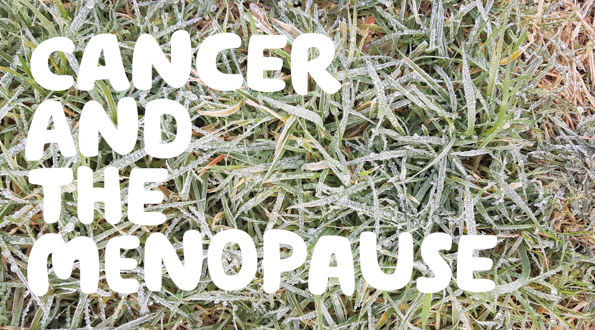
We often see members coming to the Community, asking questions and looking for support with menopausal symptoms. Some cancer treatments can cause an early or temporary menopause, or similar side effects. You might be trying to manage menopausal symptoms alongside cancer, or whilst supporting someone else who is living with cancer.
In this new mini-series of blogs we’ll be sharing links and tips for managing symptoms and raise awareness around the menopause and related symptoms.
One of the most common menopause and hormone-related symptoms, are hot flushes. They can be fairly mild, or severe enough to cause great discomfort and sleep disruption.
If you’re currently struggling with hot flushes, I hope the icy landscape images at least give the illusion of cooling you down whilst you read through this blog.

So, how can Macmillan and the Community help?
Recently, member Alydoll came to the Community to ask a question to our nurses about the side-effects experienced whilst taking Tamoxifen.
“I’ve been taking tamoxifen for 2 months now and my sleep is very erratic… waking up a lot and feel like my sleep is really light and not at all sound, so feel exhausted all day. I’m up 3/4 times a night at the loo and when I wake up I’m roasting hot.” – Community member Alydoll, in Ask a Nurse
Annerose, Cancer Information Nurse Specialist explained in the reply to Alydoll that menopausal symptoms are very common when taking hormone therapy. You can find the full question and answer by clicking here.
If you prefer, you can also go straight to the Macmillan information pages about cancer and menopausal symptoms.
Some of our other expertly sourced information pages discuss a wide range of complementary therapies which may help with hot flushes and other symptoms. Please do click on the links to have a read, as you may find some tips you've not yet considered.
I was really interested to read that two research trials have shown that using a slow, controlled breathing technique can be an effective way to manage hot flushes. This is called paced respiration. The results showed that the number of flushes was reduced, on average, by 50% to 60%.
To develop paced respiration, it is important to practice for 15 minutes, twice a day. It's recommended that you find a quiet place where you can sit comfortably without being interrupted while you practice the following exercise:
When you are confident doing paced respiration, you can use it whenever you feel a flush starting. You should continue with paced respiration until you feel the flush has passed.
Why don't you give this a try and let us know if it's been effective for you?

Whatever your experience, talking to others in similar circumstances can often be helpful. Community member Sweens1 recently asked the breast cancer group members for help with hot flushes.
“Hi all, can anyone recommend a natural remedy to help with the hot flushes and night sweats relating to the hormone treatment I’m suffering badly and really need a good nights sleep.“ - Sweens1, breast cancer group.
You can read the full thread and recommendations from members here. Please remember to always check with your cancer doctor or nurse before taking any supplements, as not all are suitable to take alongside treatment.
In a recent blog entry in the Community, Kb_3 talks about the start of menopausal symptoms at a young age, caused by breast cancer treatment. Struggling with hot flushes at night, they asked the Community for help. Member AT7 was on hand with some kind advice:
“Oh poor you - I don't really have any suggestions about hot flushes, other than my 'towel sandwich' approach. I put a towel down to sleep on and then have one between me and the duvet too. I know this sounds odd as there's the chance it could make you even warmer, but it does mean that you can cope with the sweats much more easily. There's nothing worse than waking up all hot and bothered in a damp bed, especially as the damp turns freezing cold too. It's a right kerfuffle - I hope it passes quickly!” - Community member AT7, replying to Kb_3's blog post.
But it’s not only members with breast cancer who might be experiencing these issues. Other hormone therapies, such as medications often used to treat prostate cancer can also cause symptoms similar to those experienced in menopause.
Here in the prostate cancer group, members had some advice to share when symptoms become difficult to bear.
If you want to join in with the conversations, why not comment on some of the threads or blogs shared here, or start your own discussion in the Community cancer forums.
You can find more conversations like these from across the whole Community by using the search bar. Click here to find our search on ‘hot flushes’ . If you would like to narrow down the search further, you can use the options to reduce the search results to individual groups, or content type. Please don't hesitate to let us know if you need more help.
Would you like to hear more about cancer, the menopause and other related issues? Please comment below to share your experience, or let us know what you’d like to hear more about.
If you’d prefer to comment privately, or let us know you’d like to contribute to a future blog, or need help with anything else at all, you can email us at community@macmillan.org.uk
Whatever cancer throws your way, we’re right there with you.
We’re here to provide physical, financial and emotional support.
© Macmillan Cancer Support 2026 © Macmillan Cancer Support, registered charity in England and Wales (261017), Scotland (SC039907) and the Isle of Man (604). Also operating in Northern Ireland. A company limited by guarantee, registered in England and Wales company number 2400969. Isle of Man company number 4694F. Registered office: 3rd Floor, Bronze Building, The Forge, 105 Sumner Street, London, SE1 9HZ. VAT no: 668265007